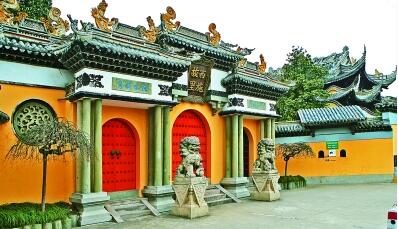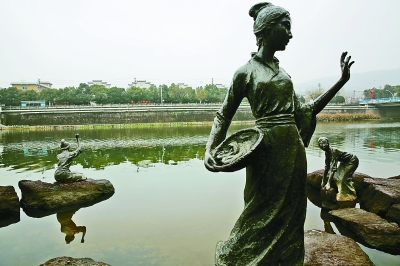Controversy over Xi Shi’s hometown: Zhuji sent an official letter to Xiaoshan asking for cancellation of fraud.


[Tracing the dispute over the hometown of celebrities]
Why Zhuji sent an urgent letter to Xiaoshan?
On February 15th and 16th, Shi Zhiban and Zhuji Municipal People’s Government of Zhejiang Province sent official letters to Zhejiang Local Records Office and Xiaoshan District Government, respectively, asking them to maintain the historical truth, and to cancel or change all the contents of Xiaoshan City Records’ false "hometown of Xi Shi".
What makes Zhuji people even more angry is that at the beginning of the new year in 2017, the relevant departments of Xiaoshan vigorously launched a slogan on Line 2 of Hangzhou Metro, the provincial capital: Millennium ancient town, hometown of Xi Shi, vibrant Linpu! Zhuji thinks this is a real false advertisement.
"On the evening of August 21st, 1959, when Chairman Mao Zedong passed Zhuji and met Sun Zifu, then secretary of Zhuji County Party Committee, on the special train, he said: Zhuji is a famous place, and beauty Xi Shi and painter Wang Mian are both here …" Comrades from the Propaganda Department of Zhuji Municipal Committee told reporters that they could not accept the "dispute over Xi Shi’s hometown" that began 30 years ago.
The reporter learned that in 2015, Xiaoshan City Records violated the Regulations on the Work of Local Records, and listed Xi Shi, an ancient man 2,500 years ago, as the number one biography of modern Xiaoshan City Records for the first time, and shouted for the first time that Xiaoshan was a place where Gou Jian was working hard. In 2016, Xiaoshan created a large-scale live-action musical "Xi Shi" and invited Tan Dun to invest 258 million yuan to sing "Xiaoshan is the hometown of Xi Shi".
This series of actions of Xiaoshan has made this debate heated up.
In 1986, Xiaoshan discovered that Mao Qiling, a scholar from Xiaoshan in the early Qing Dynasty, once quoted Liu Zhao’s annotation and wrote: "Yue Jue" said: Xiaoshan is the place where Xi Shi came from. " Wang Wei, a teacher in Xiaoshan, often published the article "Xi Shi came out of Xiaoshan", saying that "Xi Shi came out of Xiaoshan, which was first seen in the Book of the Later Han Dynasty". It is also believed that "Xi Shi was born in Zhuluo village in Yuedi (now Zhuluo village in Linpu, Xiaoshan)". "War" thus kicked off.
"According to historical records, the name of Xiaoshan County, which began in the Tianbao period of the Tang Dynasty, could not have appeared in Yue Jue Shu of the Han Dynasty. The Book of the Later Han Dynasty was written in Liu and Song Dynasties, more than 300 years earlier than the county name of Xiaoshan. According to Yuejueshu, there is no such text. It is not surprising that there are monuments of Xi Shi in Xiaoshan, because Xi Shi and Zheng Dan entered Wu from Vietnam, passing through Shaoxing, Xiaoshan, Deqing, Tongxiang, Jiashan, Huzhou, Suzhou and other places, and monuments commemorating Xi Shi appeared everywhere along the way, which some scholars call the’ Road of Xi Shi’. The’ historic site’ and’ hometown’ are completely different in nature, and the concepts cannot be exchanged to equate them. " Qi Caoliang, deputy director of Shi Zhiban, Zhuji City, told reporters that Zhuji and Shaoxing are the places where Gou Jian tried his best, and Huanjiang is in Zhuji. There has never been a Zhuluo village in Xiaoshan’s history. The present "Zhuluo Village" in Xiaoshan was formed by merging three natural villages in 2005. "Linpu has never belonged to Zhuji in history. Xiaoshan County was renamed from Yongxing in the first year of Tang Tianbao (742), and Linpu was called Linpuli as late as the Song Dynasty. "
Textual research on ten representative historical books at the national level and Shaoxing prefecture level before the Southern Song Dynasty, such as the Spring and Autumn Annals of Wuyue in the Eastern Han Dynasty (Xu Tianqiu’s annotation), the Records of Huiji in the Southern and Northern Dynasties, the Records of Ten Roads in the Tang Dynasty, the Notes of Taiping Yu in the Northern Song Dynasty, the Records of Jiatai Huiji in the Southern Song Dynasty and Fangyu.
Records of Zhuji County, which were officially edited by Zhuji officials, all have biographies and historical records of Xi Shi and Zheng Dan. There are only three Records of Xi Shi of Zhu Xi, which were officially edited by Zhuji officials in Ming and Qing Dynasties, and also include poems written by Xi Shi and Zheng Dan led by Zhu Yuanzhang, the founding emperor of Ming Dynasty. The inheritance is orderly, and there are endless books.
Zhuji pointed out that Xi Shi was never mentioned as a native of Xiaoshan in the Records of Xiaoshan County compiled by Jiajing, Wanli, Kangxi and Qianlong in the Ming and Qing Dynasties, and Xi Shi was not included in the biographies of county chronicles. Today’s "Xiaoshan City Records" has written Xi Shi, an ancient man more than 2,500 years ago, into a biography for the first time, which has neither inheritance nor historical basis.
This may be an argument that should not have happened.
This may be an argument that should not have happened.
Su Buqing, president of Fudan University, said: "The issue of Xi Shi’s birthplace has been recorded in history and verified by experts, which has long been conclusive. If you practice fraud, even if you get away with it for a while, it will be untenable in the future. "
In 2006, the State Council announced the first batch of national intangible cultural heritage lists, of which the tenth item was "Legend of Xi Shi" belonging to Zhuji City; In 2007, China Xishi Culture Research Center, a national regional cultural research center, was permanently located in Zhuji by the Ministry of Culture, which is a reaffirmation that Zhuji is the hometown of Xishi.
Successive Zhuji Municipal Party Committee and Municipal Government have done a lot of work in protecting the historical relics and cultural imprint of Xi Shi, and building Xi Shi Dian, Xi Shi Gallery, Xi Shi’s hometown scenic spot and beautiful countryside Xi Shi landscape belt. The local organization commemorates Xi Shi’s Lotus Festival every year, and holds Xi Shi Cultural Festival every two years, inviting friends, rural sages and experts at home and abroad to offer public sacrifices to Xi Shi.
He Jianmin, director of the Tourism Management Department of Shanghai University of Finance and Economics, said with emotion: "The dispute over the hometown of celebrities is actually a struggle for an iconic, attractive and revealing cultural tourism resource, so as to enhance the visibility of the region in the whole country or the whole city. With influence, there will be customers, which can attract investment and bring income. "
On the morning of 23rd, the reporter sent a message to contact Wang Zhihua, the section chief of Xiaoshan Shi Zhiban, and planned to conduct an interview on several issues: Xiaoshan said that Xi Shi’s hometown was in Xiaoshan. What is the conclusive historical basis? In the past, there was no saying in Xiaoshan local chronicles that Xi Shi’s hometown was in Xiaoshan. Why did it come up later in the new local chronicles? What is the idea that Xiaoshan started the dispute over Xi Shi’s hometown?
After not getting a reply, at noon, the reporter called Shi Zhiban directly in Xiaoshan, hoping to introduce and state some relevant information about the questions raised by Zhuji. However, the comrades who answered the phone declined the interview on the grounds that it was an "academic debate".
The reporter did not give up the interview: "At present, the two places hold their own words, but the materials provided by Zhuji are more detailed, so I hope Xiaoshan can also provide some statements. Your refusal to interview is actually a statement. "
Five minutes later, the reporter received a phone call from Wang Zhihua and promised to provide a "Xiaoshan statement" to the reporter. He sent the reporter an email entitled "The history of Xi Shi’s hometown has not yet been settled".
How should the 30-year-old debate end?
According to the "Xiaoshan theory":
In the Southern Dynasties, Liang Liu Zhao placed a bet on the "Yu Ji" in the History of the Later Han Dynasty: "Yue Jue" said: the place where Xi Shi came from. "
In the Northern Song Dynasty, Ouyang Yi wrote a book titled "A Wide Record of the Land" (Volume 22) and "On the Road between Zhejiang and Xiaoshan", saying: "Xiaoshan County is Benyu County, and the Han Dynasty belongs to Huiji County. At the end of the Han Dynasty, a nursery rhyme said: The son of heaven should flourish between the three southeastern regions, so Sun Quan changed his name to Yongxing County, and Jin was promoted because of it. Sui Province entered Huiji County. Tang Yifeng was reinstated in two years, belonging to Yuezhou. The first year of Tianbao was renamed Xiaoshan County. ….. The Vietnamese beauty is from this county. "
Zhuji believes that Xiaoshan’s statement needs to be refuted. They asked the reporter to forward the two posts of "Twenty Evidence of Xiaoshan’s Fake Hometown of Xi Shi" and "Xiaoshan’s Fake Hometown of Xi Shi Dare not Touch Six High Voltage Lines" to Xiaoshan, and asked them to carefully see if they could reply to the defense. Zhuji pointed out that the book Yue Jue Shu is a pure fraud, and it is false to check the original book. Xi Shi’s hometown is an immovable geographical coordinate. No matter how the construction evolution changes, the nature of historical sites and hometown is completely different.
On the evening of 23rd, the reporter sent the above two posts to Xiaoshan by email, asking them to express their views, but as of 5pm on 24th, the reporter had not received any reply.
"All publicity related to Xi Shi’s hometown and related contents, especially official history books, should be based on the records of previous dynasties, and should be based on national authoritative history books such as Cihai, Encyclopedia of China and Atlas of Chinese History. Xi Shi’s culture can be shared, but Xi Shi’s hometown cannot be invaded. " Qi Caoliang told reporters.
A scholar who has been paying attention to this matter and witnessed the whole debate feels sad: "We should spend more energy on the excavation and arrangement of Xi Shi culture, instead of turning over the history to compete for the hometown of celebrities for no reason."
The phenomenon revealed and reflected behind the dispute over Xi Shi’s hometown involves a series of issues, such as how to inherit China’s excellent culture, how to respect history and culture, and how to be honest in academic research. Experts suggest that the relevant departments in Zhejiang Province take the lead in organizing a seminar on Xi Shi’s hometown to solve this difficult cultural and academic problem and let all parties provide historical evidence on the spot. (Reporter Yan Hongfeng)